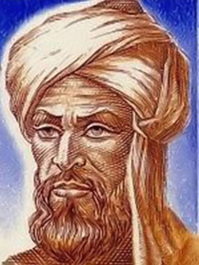Algorithm, Algebra
 When you think of algorithms and algebra, does bone-setting come to mind?
When you think of algorithms and algebra, does bone-setting come to mind?The concept of algorithms has existed since ancient times and was used by the Babylonians as early as 2500 BCE and later by the Egyptians and Greeks.
The word algorithm, meaning an Arabic system of computation, came to English in the 1690s from Old French algorisme and Latin algorismus.
These words are a mangled transliteration of al-Khwarizmi, the surname of Muhammad ibn Musa al-Khwarizmi (780 – 850 CE), a Persian mathematician, astronomer, and geographer from Uzbekistan who lived and worked in Baghdad and whose work introduced sophisticated mathematics to Western European. His work in Arabic was translated into Latin in the 12th century (also known as ‘the century of learning’). He is noted for introducing ‘Arabic numbers’ to Europe which quickly replaced ‘Roman numerals’. He was the best-known mathematician in Europe during the Middle Ages.
One of al-Khwarizmi’s most famous books was called the al-mukhtasar fi hisab al-jabr wa al-muqabala (the compendium on calculation by restoring and balancing), a book more simply known as al-jabr (the reunion of broken parts), from Arabic jabara (reintegrate, reunite, consolidate). This book is better known in English as The Algebra.
Originally, the word algebra was pronounced ‘al-JE-bra’ in the Arabic fashion. In the 17th century, the pronunciation shifted to AL-je-bra.
Interestingly, speaking of the ‘reunion of broken parts’, during the 15th and 16th centuries the English work algebra also meant ‘bone-setting’, a usage likely derived from the influence of Arab physicians working in Spain.
Reference: Online Etymological Dictionary, https://www.etymonline.com/
Published on June 26, 2022 11:12
No comments have been added yet.



